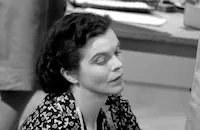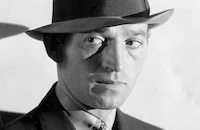Sentimental Journey

Brief Synopsis
Cast & Crew
Walter Lang
John Payne
Maureen O'hara
William Bendix
Sir Cedric Hardwicke
Glenn Langan
Film Details
Technical Specs

Synopsis
Theatrical director William O. Weatherly is deeply in love with his beautiful wife, Julie Beck, who stars in his plays and devotes herself to fulfilling his every whim. Unknown to Bill, Julie has a serious heart condition, and one day, while they are rehearsing their new play at their Long Island country home, Julie has a dizzy spell. Family friend and physician Jim Miller warns Julie that the consequences will be dire if she does not relax the busy pace of her life, and suggests adoption when Julie confides her wish that she and Bill could have a child. Julie hopes that a child will give Bill the strength to continue living if she should pass away, and soon after, she finds the perfect child while strolling along the seashore. A group of orphans from the city happily plays on the beach, but one of them, a ten-year-old girl named Mehitabel, who is called "Hitty," sits alone and watches for seahorses. Hitty imagines that Julie is the "Lady of Shalott," from Tennyson's poem, and Hitty's daydreaming reminds Julie of her own childhood fancies. After they part, Julie returns to Bill and asks him about adopting a child. Distracted by a new playscript, Bill agrees to Julie's plan, and later, after the play has opened successfully, Julie takes Bill to the orphanage to meet Hitty. Bill clumsily tries to charm Hitty, who shyly responds to his overtures. After a while, the adoption proceedings are underway and Hitty moves into Bill and Julie's elegant New York City apartment. Bill is baffled by Hitty's talk of unicorns and poetry, but the girl's relationship with Julie deepens as Julie teaches her how to pamper Bill. During a visit to the zoo, Bill buys Hitty a toy horse, which she dubs "No Name," and later, she clutches it to her as she suffers from a slight fever. Bill storms off when Julie refuses to accompany him to a party because she wants to look after Hitty, and Jim advises Julie to send Hitty back to the orphanage, as he believes that Bill will never be mature enough to welcome Hitty into the family. Soon after, Julie is trying to break the bad news to Hitty when she suffers a fatal heart attack, but before she dies, she urges Hitty to take care of Bill. Time passes as the grief-stricken Bill visits Julie's grave every day and stays with his business manager, Donnelly. Hitty's own pain and loneliness increase as she waits for Bill to come home, but one day she sees Julie's ghost, who encourages her to be cheerful for Bill upon his return. Donnelly finally persuades Bill to go home, and Hitty tenderly looks after him. The pressure is too much for Bill, and he rebuffs Hitty's attempt to serve him breakfast in the same fashion that Julie had always done. While Bill struggles to cope with Julie's death, Donnelly buys a book on child psychology and attempts to help Hitty accept Bill's decision that she be sent to boarding school. Hitty tearfully tells Bill about Julie's admonition that she should care for him, and Bill agrees to let her stay. Hitty continues to be comforted by Julie's ghost and arranges for a Sunday afternoon party at the country house, just as Bill and Julie used to do. Bill cannot enjoy himself, however, and tells his friends to leave when Hitty describes her latest visitation from Julie. Bill remains at the house while Donnelly takes Hitty back to New York, but later that evening, Hitty runs away and a frantic Bill returns to the apartment. There, he discovers a recording left for him by Julie, in which she describes Hitty as the "living link" that will always bind them. Finally realizing how much Julie loved Hitty, and how much he cares for her himself, Bill goes to the seashore to search for the girl. As Bill had suspected, Hitty has gone to the place where she first met Julie, and he rescues her as the tide comes crashing in. Back at the apartment, Bill tucks Hitty into bed and tells Donnelly that he must return to work because he now has a daughter to support.

Director

Walter Lang
Cast

John Payne

Maureen O'hara

William Bendix

Sir Cedric Hardwicke
Glenn Langan

Mischa Auer

Kurt Kreuger
Trudy Marshall
Ruth Nelson

Connie Marshall

Dorothy Adams
Mary Gordon

Lillian Bronson

Olive Blakeney

James Flavin
Mary Field

Byron Foulger

George E. Stone
John Davidson
Carol Ann Beekly
Shirley Jean Barton
Mary Ann Bricker
Donna Cooke
Carol Coombs
Peggy Miller
Bert Hicks
Crew
Charles Althouse
Don Anderson
Norbert Brodine
Les Brown
Hugh Cummings
Maurice Depackh
Bernard Freericks
Bud Green
Sol Halprin
Roger Heman
Samuel Hoffenstein
Albert Hogsett
Ben Homer
F. E. Johnston
R. A. Klune
Thomas Little
Cyril Mockridge
Walter Morosco
May Morris
Paul Neal
Kay Nelson
Emil Newman
Ben Nye
Jane Porter
Elizabeth Reinhardt
Frances C. Richardson
Fred Sersen
Edward Snyder
Murray Spivack
J. O. Taylor
R. Murray Waite
J. Watson Webb
Lyle Wheeler

Film Details
Technical Specs

Articles
Sentimental Journey -
Maureen O'Hara wrote in her autobiography that she was responsible for getting the film made. She found the script for Sentimental Journey and persuaded executive Lew Schreiber to green light the film, despite Schreiber's doubts that it would make money. Once production was over and the film was screened, it was a different story. "It was a rip-your-heart-out tearjerker that reduced my agents and the toughest brass at Fox to mush when they saw it. Lou Wasserman sobbed so loudly that he embarrassed himself. Audiences ate it up, Fox made a fortune, and I was hoping that critics might actually mention my performance for a change instead of focusing on my looks."
Sentimental Journey was a box office hit when it was released in March 1946, but not with everyone. Harvard University students voted it the Worst Film of All Time. The critics didn't go quite that far but most found it clichéd and emotionally manipulative. The New York Times critic Bosley Crowther, in one of his more colorful reviews, called it "utterly mawkish [...] a compound of hackneyed situations, maudlin dialogue and preposterously bad acting and is illogical all the way through. [...]Only William Bendix, who plays an amiable chump, gives a droll and refreshing representation of a person who might possibly exist." Buck Herzog of The Milwaukee Sentinel wrote "If all the tears shed during the unreeling of Sentimental Journey were poured on top of each other, you'd need hip boots to get out of the Palace Theater this week." However, it was the ticket-buying public that Fox was aiming for and the public loved it. So did John Payne and Maureen O'Hara, who both named it as a personal favorite. It proved to be a favorite with Maureen O'Hara fans as well. Aubrey Malone wrote in a biography of O'Hara, that when the actress traveled the world, "people would come up to her and sigh 'Oh, you were in my favorite movie.' She would be expecting them to say it was The Hunchback of Notre Dame [1939] or The Quiet Man [1952] or maybe How Green Was My Valley [1941] but they often named Sentimental Journey."
By Lorraine LoBianco
SOURCES:
Crowther, Bosley "The Screen; 'Sentimental Journey' Makes Debut at Roxy, with Maureen O'Hara, Cedric Hardwicke" The New York Times 7 Mar 46
Herzog, Buck "Reviews of New Shows" The Milwaukee Sentinel /I> 29 Mar 46
The Internet Movie Database
Malone, Aubrey Maureen O'Hara: The Biography
O'Hara, Maureen and Nicoletti, John 'Tis Herself: An Autobiography
Tyler, Don Music of the Postwar Era

Sentimental Journey -
Quotes
Trivia
Notes
The working title of this film was The Little Horse. The picture's release title was taken from the popular song "Sentimental Journey," which is heard several times throughout the film. The song, which was the theme song of band leader Les Brown, was popularized by Doris Day, Brown's singer, although her version is not heard in the film. According to information in the Twentieth Century-Fox Records of the Legal Department, located at the UCLA Arts-Special Collections Library, and Hollywood Reporter news items, Paramount was the first studio to register the title with the MPAA, but eventually relinquished it to Twentieth Century-Fox, which paid $10,000 for unlimited use of the song in the picture. Although contemporary sources refer to Mischa Auer's character as "Lawrence Ayres," he is called "Gregory Petrovich Rogozhin" in the picture. Studio records indicate that Eleanore Griffin worked on an early version of the screenplay, but the extent of her contribution to the completed film has not been determined. A mid-August 1945 memo in the legal records indicates that Bruce Humberstone was originally set to direct the picture, and a June 1944 Hollywood Reporter news item announced that Peggy Ann Garner would be the film's star. Although Hollywood Reporter production charts include Charles Russell in the cast, his appearance in the completed film has not been confirmed. A contemporary production source lists Ernest Palmer as the film's director of photography, but all other sources credit Norbert Brodine, including the onscreen credits. The studio records note that the beach sequences were shot on location at Laguna Beach, CA.
Although the Variety review stated that Sentimental Journey marked child actress Connie Marshall's first screen appearance, she had previously appeared in the 1944 Twentieth Century-Fox production Sunday Dinner for a Soldier. On September 23, 1946, John Payne, Lynn Bari and Gloria McMillan starred in a Lux Radio Theatre broadcast of the story. In 1958, Twentieth Century-Fox remade the picture as The Gift of Love, which was directed by Jean Negulesco and starred Lauren Bacall, Robert Stack and Evelyn Rudie.














